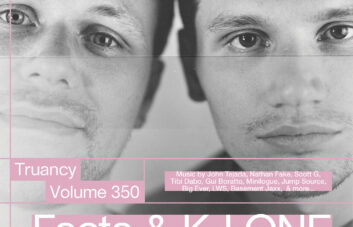Digging around in the Truants vault this week, we stumbled across this 2001 offering from Yesterday’s New Quintet, entitled “Life’s Angles” released on Stones Throw. The project’s ethos lies very deeply in hip-hop tradition and this imperative is electronically articulated by the four fictitious alter egos played by Madlib: Ahmad Miller, Monk Hughes, Malik Flavors and Joe McDuphrey; as well as Madlib under his real name, Otis Jackson Jr. The very name of the project, and album title, conjures images of a revisionist jazz band and the sound does very little to combat this preconception. But this is not straight jazz per se. To judge it in that way, as many reviews at the time seemingly did, is facile and wide of the point. It’s not even a case of hindsight being a wonderful thing; I was only 13 in 2001 and didn’t have the pleasure of discovering this sublime record until now. In fairness, ostensibly there is a lot of cut and paste going on; a nod to the hip-hop tradition, as well as plenty of sampling and splicing of rhythms to create a cacophonous dervish of, at times, almost incoherent acetate-tinged stabs. But look below the surface of that DJ-Shadow-esque, almost Squarepusher (allow it) approach to production and you ought to identify the prerogative behind the record. As Charlie Parker once asserted, jazz was “a struggle between the mind and the perversity of circumstance, and in this battle blinding virtuosity was the best weapon”. Albert Murray famously added: “The musician’s chief desire was to make the music swing harder.” This record echoes both of those insightful sentiments. “Life’s Angles” is a celebration of jazz and the essence of jazz through the lens of a hip-hop connoisseur who understands the debt that the genre owes to its jazz roots.
The LP opens up with “Prelude“: a down-tempo funk beat and a lesser-known Milt Jackson vibraphone sample, which is completed by a female vocal repeating the name of the project over and over. There are loose particles of the lysergic variety floating around in abundance here. This technique is not uncommon, indeed it is something that many other artists have used, including The Roots and Mos Def. Second track “Julani” features the dry cymbal work, feathered snare ghost notes and sparse kick drum of a diced-up sample reminiscent of the late 50s/early 60s Miles Davis peak. There are slick fills abound offset by the tranquil marimba and delectable upright bass syncopation. There are many standout tracks to be explored here… “Keeper of My Soul” features more of the same appeal found in “Julani”. “The Science” is one big drum solo, featuring electronic bleeps and reviving the synth experimentation of the early 70s that Herbie Hancock et al were more renowned for. The title track, for us, is the finest example of a carefree jubilant celebration of the genre, the melody is uplifting, the strings harmonise beautifully, the infectious percussion and coherent drum patterns allow freedom to nod your head in enjoyment, which is absent for significant chunks of the record; the overall effect is one of liquid sunshine. There is a playful variety unified by a common ethos on this record; “Rugged Tranquility“ takes influence from the latin-infused bossa nova rhythms of the mid 60s, while “Daylight” could almost be the beat for a 90s RnB joint at times. “Sun Goddess“ really lays down a smooth nod-your-head groove with scattered keys, sustained synthetic strings and yet more of that bottled jubilance; a device that draws the record together, where it might otherwise seem disparate and disconnected. Latter tracks like “Broken Dreams“ provide a lullaby effect that allow the album to play out gracefully; a gin-soaked afternoon in the sun would be complete with this as a figurative ritenuto. If you are looking to enjoy something extraordinary, yet somewhat laid back and jubilant this week, look no further.




